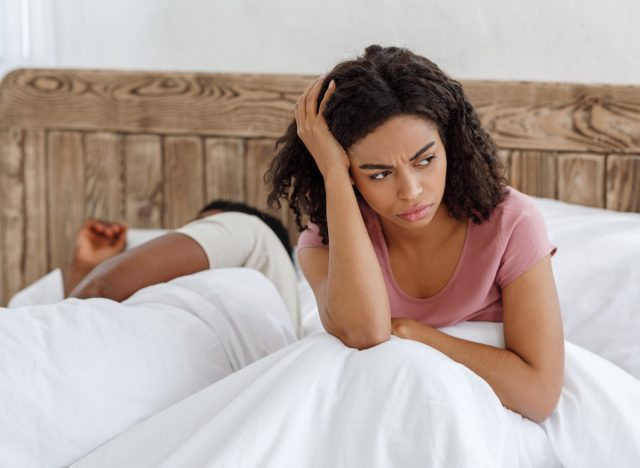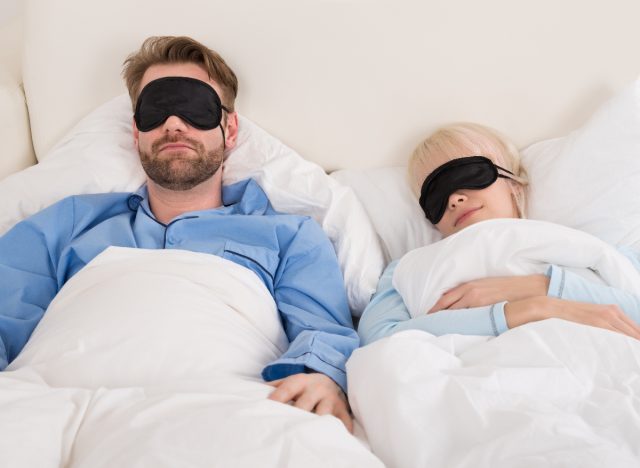Sharing a Bed With a Light, Restless Sleeper? These Tips Will Help

If you’re a light sleeper, getting solid Z’s is undoubtedly a challenge. And if you sleep with someone who’s just as bad at sleeping as you are, a restful night can be almost impossible. If you’re sharing a bed with a light, restless sleeper, these tips will help.
Eat This, Not That! reached out to Dr. Peter Polos, MD, Ph.D., FCCP, FAASM, sleep medicine specialist and Sleep Number sleep expert to learn just how sharing a bed with a light, restless sleeper can impact your overall wellness. While there are good and bad points to having a partner to cuddle with all night long, doing so when you’re not a sound sleeper can negatively impact your health.
A light sleeper typically wakes up much easier than other sleepers from triggers such as movement, noises, or even light. Dr. Polos explains, “The arousal threshold in these individuals is lower than others. There are theories as to why that is so. Some propose there may be a genetic link; others suggest it is habit based on years in a particular sleep environment.”
Sharing a bed with someone presents pros and cons.

Sleeping with someone presents pros and cons. The secure feeling can create a stronger bond between you and also help both of you get to sleep easier—and stay asleep. But let’s look at some of the negatives and what to do about them.
One of the biggest disagreements on sleep comfort has to do with temperature, because some like it hot, and some do not. How hot or cold to keep the room temperature set at and how many covers are necessary can be pretty tough to agree on for some couples.
Dr. Polos shares, “Eighty-three percent of couples have reported sleeping too hot or too cold.” He adds, “An ideal room temperature is approximately 68 degrees throughout the year. If you and your partner can’t agree on an ideal temperature, you might want to consider temperature-balancing options. Sleep Number’s Climate360™ smart bed also has active temperature-adjusting technology and a personalized microclimate.”
If you sleep with a snorer, you are probably nodding your head right now and rolling your eyes. Dr. Polos says, “Snoring is another common complaint and is often a reason why couples may sleep in separate beds.”
One top sleep disorder is insomnia, which can be so hard to deal with. The condition can cause feelings of resentment towards the non-sleeper.
The good news here is, sometimes a given situation can improve or work itself out over time. Everyone’s body endures changes as they age, along with their needs. But for the time being, let’s discuss how to correct the situation with some more tips that may be helpful.
Establish a routine for sleeping and waking up.
Establish a sleep routine for both heading to sleep and waking up. For example, get into bed at the same time each night and read a bit before turning out the light. In addition, make sure your sleep environment is clean, relaxing, dark, cool, quiet, and free from your computer, television, and cell phone.
Implementing small changes may be an easy fix.

Dr. Polos suggests making some small tweaks, like changing your position, or something as simple as getting a new pillow or bed for a potentially easy fix.
“Pillows can properly align your head, neck, and shoulders to help open your airways and reduce snoring. Adjustable beds, like Sleep Number’s 360® smart beds, allow you to change the settings to your liking, which is great for partners who have different sleeping preferences. There is even a partner snore feature,” advises Dr. Polos.
In addition, light sleepers can try a sleep mask, a weighted blanket, a body pillow, ear plugs, temperature balancing sheets, and a white noise machine to drown out distracting sounds.
Sleeping in different rooms is an option.
Another thing Dr. Polos recommends trying is sleeping in different rooms. “Sleeping in different rooms, at best, solves the problem for only half the couple and is obviously not ideal. In many cases, it is possible to fix the situation and allow normal sleeping arrangements to prevail.”
Pinpoint why your partner is a light sleeper.
If you try these modifications and are still not sleeping well, seeking medical advice is recommended. There may be underlying sleep conditions that need to be addressed.
Dr. Polos advises, “Where possible, it is best to identify why an individual is a light sleeper, such as anxiety or a sleep disorder. Correcting these can be very beneficial to both parties.” He adds, “Communicate with your partner to identify the factors affecting your sleep. Between this and the use of a sleep specialist (if needed), the sleep quality of both parties can be improved.”








